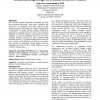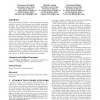CANDC
2005
ACM
14 years 1 months ago
2005
ACM
The Human-Computer Interaction community has long been concerned with design. Terms such as ‘creativity’ and ‘innovation’ are frequently used when referring to the design ...
CIKM
2008
Springer
14 years 1 months ago
2008
Springer
Online communities are connecting hordes of individuals and generating rich social network data. The social capital that resides within these networks is largely unknown. We propo...
CIKM
2008
Springer
14 years 1 months ago
2008
Springer
As online social networking emerges, there has been increased interest to utilize the underlying social structure as well as the available social information to improve search. In...
ATAL
2008
Springer
14 years 1 months ago
2008
Springer
This paper presents MADeM, a multi-modal agent decision making to provide virtual agents with socially acceptable decisions. We consider multi-modal decisions as those that are ab...
HT
2009
ACM
14 years 2 months ago
2009
ACM
We introduce four measures for the change of coalitions in social networks. The first one measures the change of the agents in the network over time, The second one measures the ...
ECTEL
2006
Springer
14 years 3 months ago
2006
Springer
With increasingly conceiving learning as a social activity, technological support must become more aware of the social context of the individual in order to be able to provide adeq...
CIKM
2006
Springer
14 years 3 months ago
2006
Springer
We propose a method for discovering the dependency relationships between the topics of documents shared in social networks using the latent social interactions, attempting to answ...
CIA
2006
Springer
14 years 3 months ago
2006
Springer
We present a mechanism for collaboration and coordination amongst agents in multi-agent societies seeking social equity. This mechanism allows to compute egalitarian allocations of...
ATAL
2006
Springer
14 years 3 months ago
2006
Springer
Intelligent agents are typically situated in a social environment and must reason about social cause and effect. Such reasoning is qualitatively different from physical causal rea...
ICASSP
2009
IEEE
14 years 3 months ago
2009
IEEE
This paper presents a novel social media summarization framework. Summarizing media created and shared in large scale online social networks unfolds challenging research problems....


